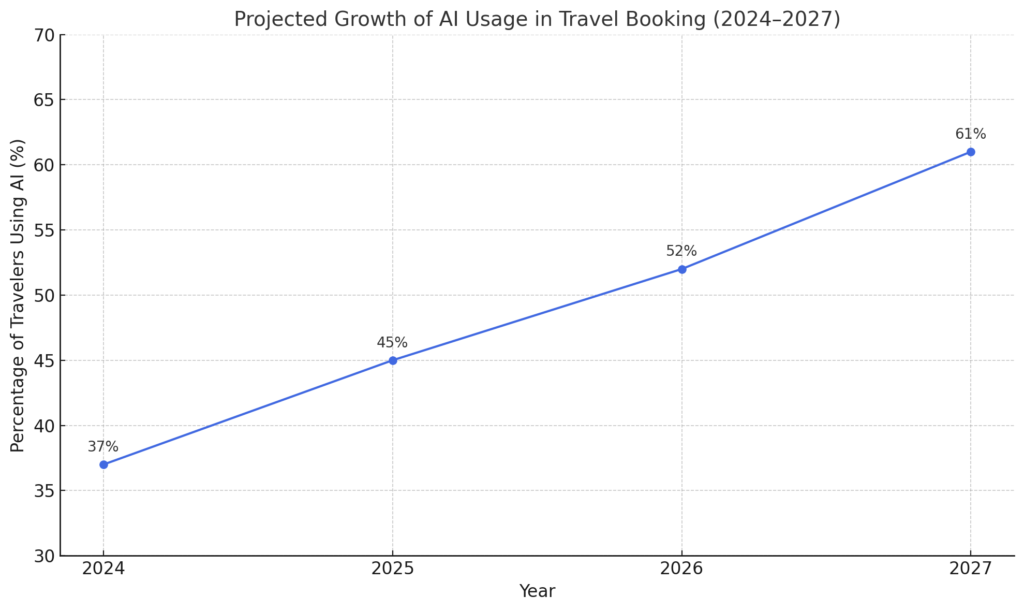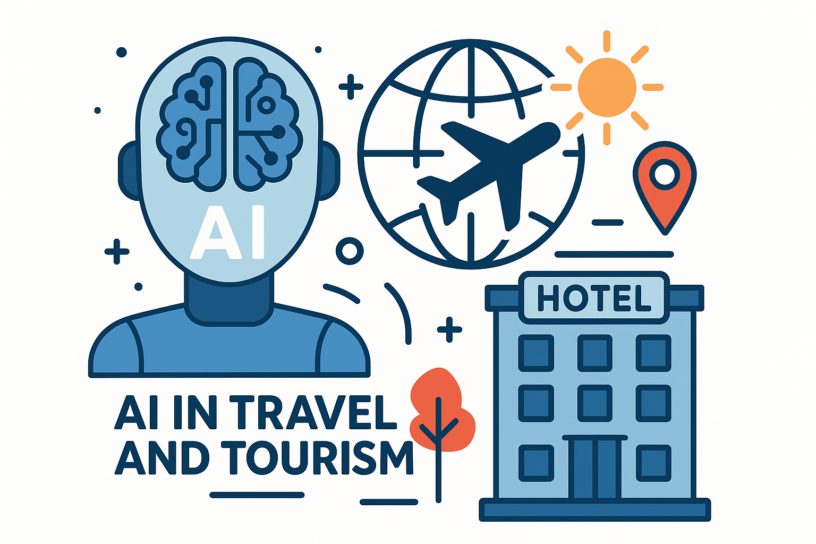The AI in travel and tourism industry is evolving rapidly, creating smarter, faster, and more personalized experiences for both travelers and businesses. From chatbots handling customer queries to predictive analytics forecasting demand, artificial intelligence is reshaping every part of the tourism lifecycle.
In this blog, we explore the top AI use cases, benefits, challenges, and future trends that are defining the modern travel experience. Whether you’re a tech enthusiast, a traveler, or a business looking to adapt, this guide covers everything you need to know about AI’s role in global tourism.
1. Personalization and AI in Travel Planning
The use of AI in travel industry has made trip planning deeply personalized:
- AI analyzes user behavior, preferences, and budgets to recommend destinations, flights, hotels, and experiences.
- Apps like Google Travel and Hopper use AI development services to generate suggestions tailored to each traveler.
- Itinerary planning is becoming a hands-free task thanks to Generative AI in travel industry tools.
With these innovations, businesses are delivering experiences that resonate better with their audience.
2. Smart Chatbots and Virtual Assistants
A major breakthrough in AI in travel and hospitality is AI-powered customer service:
- Airlines like KLM and Emirates use virtual assistants for flight bookings, updates, and FAQs.
- Hotels leverage AI for contactless check-in and 24/7 concierge support.
- Language barriers are broken using AI-based NLP chatbots that operate in multiple languages.
These tools, often built by experienced AI consultants, handle thousands of requests without human intervention—improving customer satisfaction and reducing operational costs.
3. Real-Time Translation and Accessibility
Another powerful AI use case in travel is real-time language translation:
- Apps like Google Translate and iTranslate help travelers decode signs, menus, and conversations.
- Tour companies use AI headsets and apps to guide multilingual groups.
These tools make AI in travel and tourism industry more inclusive and traveler-friendly, especially in remote or non-English speaking destinations.
4. Virtual Reality, AR, and Generative AI
Before committing to a trip, travelers can now experience it virtually. This is where Generative AI in travel industry and immersive tech intersect:
- Museums and heritage sites offer AI-powered virtual tours.
- AR apps like TimeLooper let you see how landmarks looked centuries ago.
- Hotels provide 360° virtual walk-throughs before booking.
This trend boosts transparency and helps travelers make confident decisions.
5. AI in Dynamic Pricing and Demand Forecasting
AI in travel and transport has completely changed how pricing works:
- Airlines and OTAs (Online Travel Agencies) adjust fares in real-time using predictive analytics.
- Hotel chains use AI to forecast occupancy, set dynamic pricing, and offer discounts at optimal times.
These techniques are among the top AI use cases in travel, helping providers increase revenue while offering competitive rates to users.
6. Travel Safety and Risk Alerts
Traveler safety is another area where AI in travel and tourism industry shines:
- Real-time weather, political, and health alerts.
- AI-driven platforms reroute trips or notify travelers of disruptions.
- Corporate travel platforms monitor employee locations using AI tools.
This is essential for companies offering AI development services to B2B travel platforms and insurance providers.
7. Automation and Feedback Analysis
AI helps analyze customer feedback and automate internal processes:
- NLP tools scan reviews to extract common themes and sentiment.
- AI recommends service improvements or upsells based on user behavior.
- Back-end processes like ticketing, invoicing, and reporting are becoming automated.
Businesses ask AI consultants to integrate these solutions with existing CRM and booking platforms.
8. Smart Airports and AI in Travel Transport
Many global airports are already deploying AI in travel and transport services:
- Facial recognition speeds up security checks and boarding.
- AI-driven robots assist with navigation and lost-and-found services.
- Baggage handling uses AI to reduce mishandling and theft.
Smart airports like Singapore Changi and Heathrow are leading examples of this transformation.
9. Sustainability Through AI
Eco-conscious travel is growing fast, and AI in travel industry is leading the charge:
- Route optimization reduces fuel consumption and CO₂ emissions.
- AI helps tourists choose eco-friendly stays and transport options.
- Travel agencies measure carbon footprints with the help of AI systems.
Companies offering AI development services now build sustainability tracking as a standard feature.
10. The Future of AI in Travel and Tourism Industry
Here’s where the road leads next:
- Hyper-personalization of every step in the journey.
- Emotion-aware AI for better guest experience.
- Voice-based and chatbot itinerary building using Generative AI in travel industry.
- New opportunities for startups focused on niche travel AI products.
If you’re wondering how to use AI in travel industry for your brand—this is the right time to act.
Real-World Use Cases
- Skyscanner: Uses AI to suggest best times to book flights.
- Hilton’s Connie: A robot concierge powered by IBM Watson.
- Japan’s Henn-na Hotel: A fully AI-operated hotel experience.
These AI use cases show how practical and scalable AI is becoming across all levels of the travel and tourism industry.
What Percentage of Travellers Use AI in Their Booking Process?
According to industry data, 37% of travelers globally use AI-driven platforms when booking trips—be it for recommendations, pricing, or support. This figure is expected to hit 60%+ by 2027, showing massive adoption of AI in travel industry solutions.

Here is the graph illustrating the projected growth of AI usage in travel booking from 2024 to 2027. It shows a clear upward trend, with an estimated increase from 37% in 2024 to over 60% by 2027. Let me know if you’d like this as an image file or want it embedded in your blog HTML.
FAQs: AI in Travel and Tourism
AI helps users plan trips by offering personalized destination suggestions, price forecasting, and activity recommendations.
They hire AI consultants to build, implement, and scale smart solutions like chatbots, predictive analytics tools, and personalization engines.
Dynamic pricing, itinerary recommendations, language translation, customer service automation, and sentiment analysis are top use cases.
Start with chatbots, AI-based CRM integration, and personalized marketing campaigns. Gradually add advanced features like AR tours and voice booking.
Yes, generative AI can create content-rich, visual travel experiences such as itinerary drafts, hotel writeups, or destination previews.
Conclusion
The AI in travel and tourism industry is accelerating faster than ever, offering both travelers and businesses unmatched efficiency, personalization, and value. From AI-powered recommendations to real-time risk alerts, the AI use cases in travel are diverse and impactful.
Companies that adopt AI early and wisely—through AI development services and experienced AI consultants—will shape the future of tourism. As we step into this new era, the journey will be smarter, more sustainable, and more connected than ever before.









Leave a Reply Cancel reply